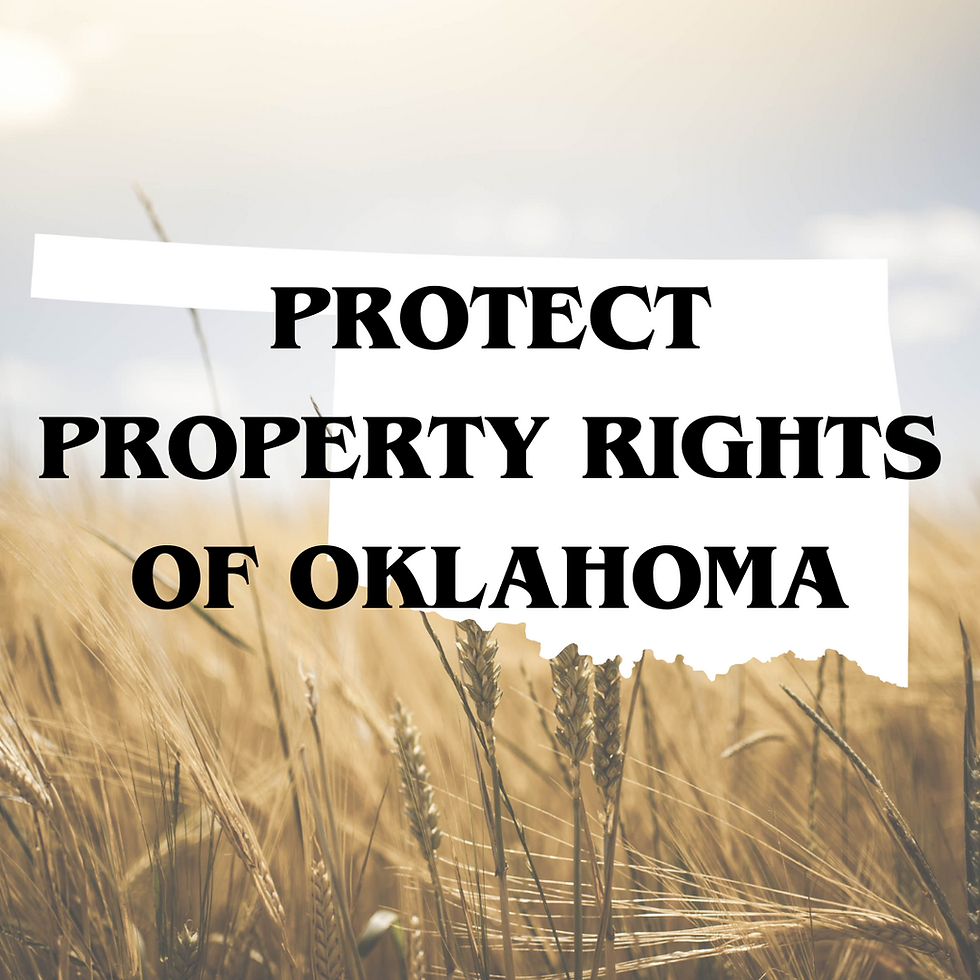If we give the State a Cookie...
- destinee10
- Feb 22, 2025
- 3 min read
Updated: Feb 23, 2025

Remember the children’s book “If You Give a Mouse a Cookie”? Well, then you know what happens when you inadvertently begin to give your rights away.
This week the House passed a bill in the Utilities committee that strips all but 12 of Oklahoma’s 77 counties of personal property rights. The bill as it stands, allows your neighbor to lawfully stop you from utilizing your land for profit.
HB2751 reads if your county meets a certain population density OR an average windspeed of less than 9.5 mph, there will be a minimum of a ¼ mile setback from any non-participating landowner. At first glance, you may think “that’s not too bad!” But let’s put that into action, shall we?
Imagine you are the average age of an Oklahoma landowner (58). You own the state average of 435 acres. As a wheat farmer and cattle rancher, myself, I can promise that you also have a “day job” outside the farm. You just put three kids through Oklahoma State University. Your wife is a schoolteacher and looking to retire in a few years, and ideally you would like to join her shortly thereafter to live your days out as the farmer and rancher you dreamed to be.
The kicker is the average farmer and rancher in Oklahoma earns a mere $40,000/year.
With most of your savings spent sending three kids through college, you are not sure if you can ever afford to retire.
Now, imagine a leasing agent knocks on your door and presents you with a wind lease. The 3.4 MW turbine is paying a total of $17,000. You sign the lease and years later into development, your wife retires and you are slated to receive 2 turbines.
$34,000/year (with an appropriate inflation escalator) of guaranteed revenue. The best part? Those two turbines are only taking about 3 acres out of production.
You have now nearly doubled your farm’s income with those 3 acres.
Now imagine this law passes. Your neighbor to the north, who does not live on the property, says NO. They decline to participate in the project becoming a “non-participating” owner. I am sad to say, your turbines are now off the table. Your neighbor now has the legal authority to decline you a revenue source on your own property.
I can hear it now, “I don’t like wind, I don’t want them.” Great, you always have the right to say no. But what happens when you give a mouse a cookie?
What happens when the same conversation leads to oil and gas companies? Many, many folks do not want to live next to a noisy compressor station or well site.
What happens when the state decides black cattle are more profitable than red cattle, so unless you own more than 500 cows, you need to raise black cattle? Maybe they prefer grass fed over grain finished?
What happens when the state decides whether you can place a barn or pens too close to a neighbor’s land who bought their land for recreation?
That may sound like a stretch, but is it? Relinquishing freedoms of any kind is a slippery slope.
If I can tell you what you can or cannot locate on your property, do you even own your property?
The lawmakers are claiming this is driven by constituents. And, that is partly true. There is and will always be a small group of opposition to anything, including wind generation in Oklahoma. That is our God-given liberty.
However, use Craig County as an example. There was a noisy opposition group, perhaps the noisiest in the state, that successfully managed to get a moratorium vote on the November 2024 ballot. This would have stopped any wind project in that county, period. Do you know the results? It failed by 76%! 76% of the voters voted to uphold private property rights and allow freedom of choice.
So, if 76% of one of the most “opposing” voters opted for the right to say yes, why are lawmakers working so hard to take that right away?
Whether you support or even like wind energy, this is a clear violation of private property rights. You can hate the idea of wind and still support your right to choose.
We are living in scary times when Republican lawmakers in the country’s most freedom-loving state are working overtime to put restrictions on property owners.
So, I ask—if we give the state a cookie, whose milk will they ask for next?
Written by: Destinee Weeks, Development Director



Comments